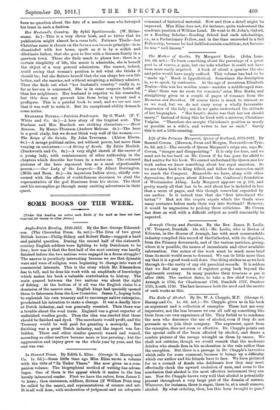WKS . BOOKS OF THE
[Under this heading vs notice such Books of the wok as hays not been isssrved for mews in otksy farms.]
Anglo-Dutch Rivalry, 1600-1653. By the Rev.. George Edmund- son. (The Clarendon Press. 65. net.),—The lives of two great British heroesPhilip. Sidney and Robert Blake—suggest a hard and painful question. During the second half of the sixteenth .century English soldiers were fighting to help Dutchmen to be- free ; how was it that the first half of the next century was hardly- finished before the two nations were engaged in a florets struggle P The answer is peculiarly interesting because we see that dynastic wars and wars of religion were beginning to change into wars of .commercial interests. This i5 the story whieh. Mr. Edirundson has to tell, and he does his work with an amplitude of knowledge which makes his book a valuable contribution to history. The main quarrel between the two nations was about the, right of fishing. At the bottom of it all was the English claim to a dominion of the narrow seas. English kings had specially opened these to fishermen from the Low Countries. James I., hoping both to replenish his own treasury and to encourage native enterprise, proclaimed his intention to make a change. It was a deadly blow at Dutch industry, and was generally resented. Then there was -a trouble about the wool trade. England was 3 great exporter of unfinished woollen goods. Then the idea was started that these should be finished and dyed. The merchants would profit, and the Treasury would, be well paid for granting a monopoly. But finishing was a great Dutch industry, and the import was for- bidden. These and other similar quarrels waxed and waned, according as other matters became more or less pressing ; but the aggravation and injury grew on the whole year by year, and the end was war.










































 Previous page
Previous page